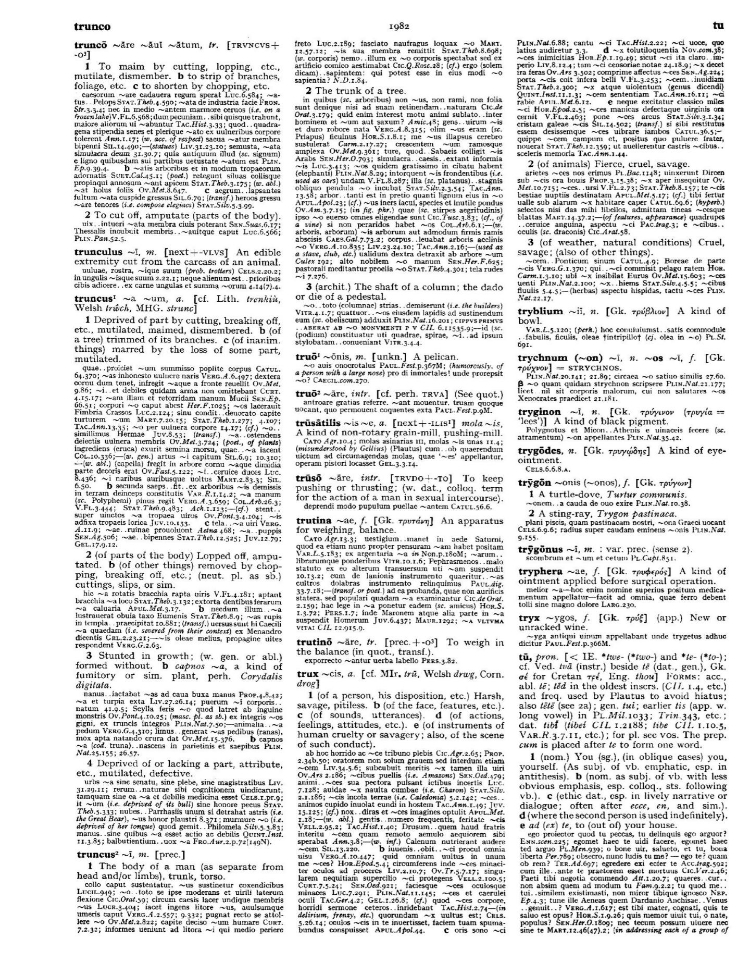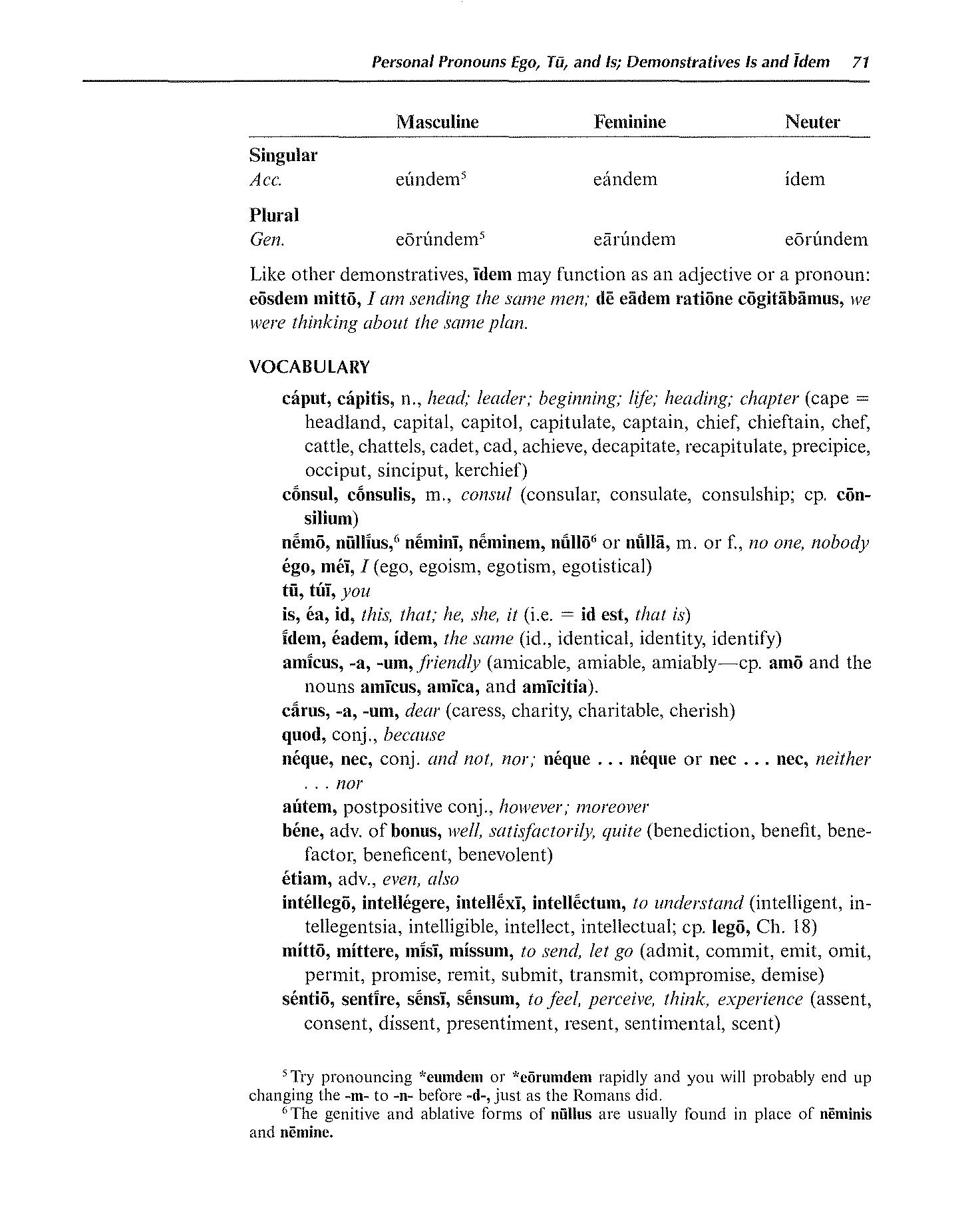
page_listing.tpl
page_subListingDetails.tpl
sub_listingDetails_style1.tpl
sub_listingDetails.title.tpl
tū, tuī you
tū, tuī is a Latin Pronoun that primarily means you.
Definitions for tū, tuī
Wheelock's Latin
Pronoun
- 1
you
Oxford Latin Dictionary
Pronoun
- 1
(nom.) You (sg.), (in oblique cases) you, yourself. (As subj. of vb. emphatic, esp. in antithesis). (b) (nom. as subj. of vb. with less obvious emphasis, esp. colloq., sts. following vb.). (c) (ethic dat., esp. in lively narrative or dialogue; often after ecce, en, and sim.). (d) (where the second person is used indefinitely). (e) ad (ex) te, to (out of) your house.
- 2
(in emphatic forms or w. various emphatic particles): (a) (acc. or abl. in redupl. form tētē). (b) (num. tūte). (c) (acc., dat. w. enclitic -met; sim. tutemet). (d) (nom. or acc. w. quidem, attached to form one word, the pron. being scanned as short).
Sentences with tū, tuī
Latin to English
Ego eīs pecūniam dabō; quid tū dabis?Compare I shall give them money; what will you give?
Tū ipse nōn mūtāris, sed nōmen tuum mūtātur.Compare You yourself (sg.) are not being changed, but your name is being changed.
Tū mē hortāris ut sim animō magnō et spem salūtis habeam, sed timeō nē sim īnfīrmior.Compare You urge me to be of great courage and to have hope of safety, but I fear that I may be too weak.
An tu civem ab hoste natura ac loco, non animo factisque distinguis?Compare Do you distinguish a citizen from an enemy by race and by locality, not by character and conduct?
Absentem qui rodit amicum, qui non defendit alio culpante, solutos qui captat risus hominum famamque dicacis, fingere qui non visa potest, commissa facere qui nequit: hic niger est, hunc tu, Romane, caveto.Compare The man who backbites an absent friend, nay, who does not stand up for him when another blames him, the man who angles for bursts of laughter and for the repute of a wit, who can invent what he never saw, who cannot keep a secret - that man is black at heart: mark and avoid him, if you are a Roman.
Ego tu non demens puto, qui hic audeo primum facio, deinde confiteor?Compare Shall I not deem you mad, you who have dared first to do, then to confess this?
Tu vero felix, Agricola, non vitae tantum claritate, sed etiam opportunitate mortis.Compare You were indeed fortunate, Agricola, not only in the splendor of your life, but also in the opportune moment of your death.
Currens Lepta venio, egoque nuntio tui iam castra praetergredior.Compare Lepta came running, and announced to me that you had already passed the camp.
Data sources
Notes
- Definitions
- Frederick M. Wheelock, Wheelock's Latin, 6th ed., rev. Richard A. LaFleur (New York, NY: HarperCollins Publishers, 2005): 71.
- P. G. W. Glare, Oxford Latin Dictionary, Vols. 1-8 (Oxford: Clarendon Press, 1982): 1982.
- Word frequencies
- Christopher Francese, "Latin Core Vocabulary," Dickinson College Commentaries, last modified 2014, http://dcc.dickinson.edu.
- Paul B. Diederich, The Frequency of Latin Words and Their Endings, PhD diss., (Columbia University, 1939).
- Louis Delatte, Suzanne Govaerts, Joseph Denooz, and Etienne Evrard, Dictionnaire fréquentiel et index inverse de la langue latine [Frequency Dictionary and Inverse Index of the Latin Language] (Liège, Belgium: Laboratoire d'analyse statistique des langues anciennes de l'Université de Liège [L.A.S.L.A.], 1981): 119.
Bibliography
Allen, Joseph H. Allen and Greenough's New Latin Grammar for Schools and Colleges: Founded on Comparative Grammar. Edited by James B. Greenough, George L. Kittredge, Albert A. Howard, and Benjamin L. D'Ooge. Boston, MA: Ginn & Company, 1903.
Crystal, David. A Dictionary of Linguistics and Phonetics. 6th ed. Oxford, UK: Blackwell Publishing, 2008.
Delatte, Louis, Suzanne Govaerts, Joseph Denooz, and Etienne Evrard. Dictionnaire fréquentiel et index inverse de la langue latine [Frequency Dictionary and Inverse Index of the Latin Language]. Liège, Belgium: Laboratoire d'analyse statistique des langues anciennes de l'Université de Liège (L.A.S.L.A.), 1981.
Diederich, Paul B. The Frequency of Latin Words and Their Endings. PhD diss., Columbia University, 1939.
Francese, Christopher. "Latin Core Vocabulary." Dickinson College Commentaries. Last modified 2014. http://dcc.dickinson.edu/latin-vocabulary-list.
Gildersleeve, Basil L., and Gonzales Lodge. Gildersleeve's Latin Grammar: Third Edition, Revised, and Enlarged. 3rd ed. London, England: Macmillan and Co., 1903.
Glare, Peter G.W. Oxford Latin Dictionary. Vols. 1-8. Oxford, England: Clarendon Press, 1982.
Krüger, Bernd. "Latin Conjugation Tables." Cactus2000. Accessed May 5, 2023. https://latin.cactus2000.de/index.en.php.
Pierson, Nick. "Sound of Text." Accessed October 26, 2019. https://soundoftext.com.
Wheelock, Frederick M. Wheelock's Latin. 6th ed. Revised by Richard A. LaFleur. New York, NY: HarperCollins Publishers, 2005.
Wiktionary Contributors. "Victionarium." Wikimedia Foundation, Inc. Updated March 18, 2019. https://la.wiktionary.org/wiki/Victionarium:Pagina_prima.
Citation
Chicago (17th ed.)
Allo Contributors. "tū, tuī (pron.) - Latin Word Definition." Allo Latin Dictionary. Last modified . Accessed February 23, 2026. http://ancientlanguages.org/latin/dictionary/tu-tui.
Entry created on . Last updated on .








